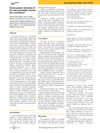 2 citations,
July 2022 in “Dermatology Reports”
2 citations,
July 2022 in “Dermatology Reports” EPDS and MS might share an immune-related cause.
 2 citations,
August 2020 in “International Journal of Cosmetic Science”
2 citations,
August 2020 in “International Journal of Cosmetic Science” Lindera strychnifolia root extract may help balance scalp bacteria and potentially reduce hair loss.
 2 citations,
August 2019 in “BMC Complementary and Alternative Medicine”
2 citations,
August 2019 in “BMC Complementary and Alternative Medicine” Asiasari radix extract may be a potential treatment for melanoma because it selectively triggers cell death in melanoma cells by affecting p53 regulation.
 2 citations,
January 2019 in “Annals of Dermatology”
2 citations,
January 2019 in “Annals of Dermatology” Certain gene variations in EGF and EGFR may increase the risk of alopecia areata in Koreans.
 2 citations,
January 2018 in “Elsevier eBooks”
2 citations,
January 2018 in “Elsevier eBooks” Targeted therapies for lung cancer are effective but require careful management of side effects to benefit patients.
 2 citations,
October 2010 in “Reviews in Medical Microbiology”
2 citations,
October 2010 in “Reviews in Medical Microbiology” Syphilis is becoming more common and remains a major health problem due to challenges in prevention and treatment.
 1 citations,
June 2023 in “Ethnobotany research and applications”
1 citations,
June 2023 in “Ethnobotany research and applications” The review concludes that the Ziziphus species, especially jujube, may promote hair growth and have various health benefits, warranting more research.
 1 citations,
January 2020 in “International journal of research in pharmacy and chemistry”
1 citations,
January 2020 in “International journal of research in pharmacy and chemistry” Eclipta alba has many health benefits and potential for medical and nutritional use.
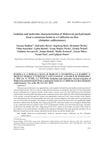 1 citations,
May 2019 in “Veterinarski arhiv”
1 citations,
May 2019 in “Veterinarski arhiv” The yeast found in a sea lion's skin lesion was almost identical to that on healthy skin, suggesting environmental factors may affect fungal growth and the cause of the lesion is unclear.
 1 citations,
October 2018 in “InTech eBooks”
1 citations,
October 2018 in “InTech eBooks” The document concludes that treatments for cicatricial alopecia are not well-supported by evidence, but hair transplantation shows more predictable and satisfactory results.
 1 citations,
September 2016 in “Journal of Obstetrics and Gynaecology Research”
1 citations,
September 2016 in “Journal of Obstetrics and Gynaecology Research” The study found no significant link between Helicobacter pylori infection and polycystic ovary syndrome in young females.
 1 citations,
June 2012 in “Actas Dermo-Sifiliográficas”
1 citations,
June 2012 in “Actas Dermo-Sifiliográficas” Early and aggressive treatment of scarring alopecia is important to prevent further hair follicle damage.
 1 citations,
April 2010 in “Expert Review of Dermatology”
1 citations,
April 2010 in “Expert Review of Dermatology” The document concludes that early diagnosis and treatment are crucial for managing rare hair loss disorders and that more research is needed to improve treatment strategies.
 1 citations,
January 2010 in “Elsevier eBooks”
1 citations,
January 2010 in “Elsevier eBooks” Any drug can cause skin reactions, but antibiotics, NSAIDs, and psychotropic drugs are more common, with some reactions being life-threatening.

Sunekos® effectively improves labia majora appearance and is well-tolerated.
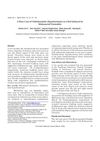 January 2024 in “The Indian Veterinary Journal”
January 2024 in “The Indian Veterinary Journal” A young goat with skin issues improved with medication and supplements.
 January 2024 in “Theranostics”
January 2024 in “Theranostics” Exosomes from special stem cells help treat ulcerative colitis by reducing inflammation and stress.
 December 2023 in “bioRxiv (Cold Spring Harbor Laboratory)”
December 2023 in “bioRxiv (Cold Spring Harbor Laboratory)” Aged individuals heal wounds less effectively due to specific immune cell issues.
 December 2023 in “International Journal of Science and Research (IJSR)”
December 2023 in “International Journal of Science and Research (IJSR)” Herbal treatments are effective and preferred for hair loss with fewer side effects.
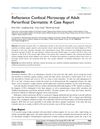 July 2023 in “Clinical, cosmetic and investigational dermatology”
July 2023 in “Clinical, cosmetic and investigational dermatology” Reflectance confocal microscopy helped tell periorificial dermatitis apart from similar skin conditions.
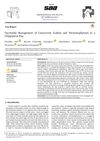 June 2023 in “Small animal advances”
June 2023 in “Small animal advances” A Chippiparai pup was successfully treated for scabies and a fungal infection using ivermectin and topical solutions.
 January 2023 in “Pesquisa Veterinária Brasileira”
January 2023 in “Pesquisa Veterinária Brasileira” A KRT71 mutation in Hereford cattle in Uruguay causes thin, curly hair and scaly skin.
 July 2022 in “International journal of dermatology, venereology and leprosy sciences”
July 2022 in “International journal of dermatology, venereology and leprosy sciences” More frequent and severe skin problems are linked to higher daily alcohol consumption.

False daisy is a medicinal herb with many health benefits, including hair growth promotion.
 September 2021 in “Research Square (Research Square)”
September 2021 in “Research Square (Research Square)” Not having enough or having too much of the protein Grainyhead-like 3 leads to various developmental problems.
 September 2021 in “Farmacja Polska”
September 2021 in “Farmacja Polska” Scalp needle mesotherapy can effectively treat hair loss and improve hair growth.
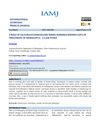 June 2021 in “International Ayurvedic Medical Journal”
June 2021 in “International Ayurvedic Medical Journal” Ayurvedic treatments like leech therapy and turmeric-neem paste can effectively treat alopecia areata without harmful side effects.
 September 2020 in “Journal of Investigative Medicine”
September 2020 in “Journal of Investigative Medicine” Omics techniques are needed to understand the scalp microbiome's role in alopecia areata for new treatments.
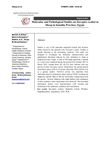 August 2020 in “Egyptian Veterinary Medical Society of Parasitology Journal (EVMSPJ)”
August 2020 in “Egyptian Veterinary Medical Society of Parasitology Journal (EVMSPJ)” 10.5% of sheep in Ismailia, Egypt, had Sarcoptes scabiei, causing skin issues.

The document concludes that diagnosing female hair loss requires careful examination, with treatments varying by condition and psychological support often necessary.






























